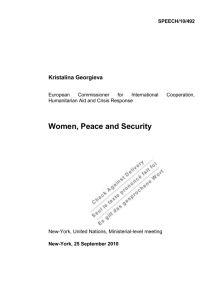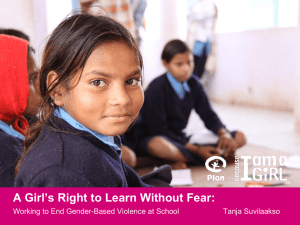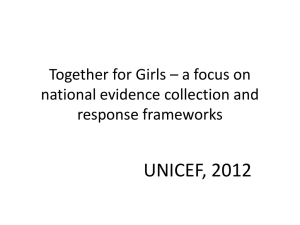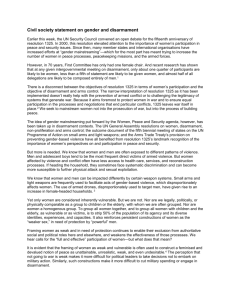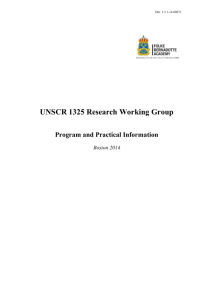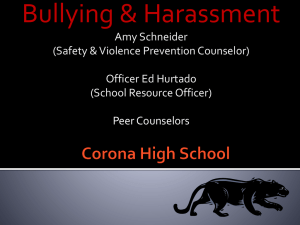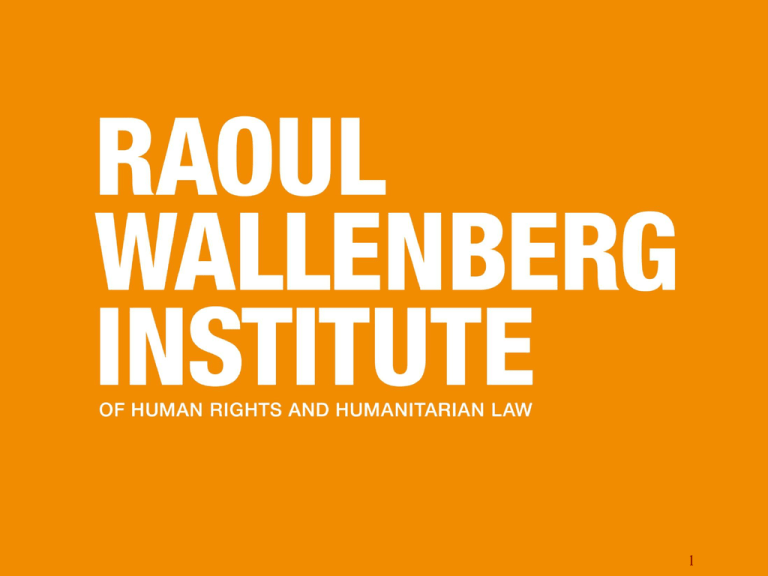
1
Women, Peace and Security
GenderMintre
Gender Mainstreaming in Conflict
M. Estrada
2
Gender Mainstreaming
International Policy of gender mainstreaming
Gender perspectives integrated into all elements of policy
development in all sections
Security Sector Reform,
Disarmament,
Demobilization and Reintegration,
Police,
Military
Elections
From initial planning through to evaluation.
3
Women, Peace and Security’ Agenda
Women continue to be largely absent from, or
play symbolic roles, in formal peace processes.
Social and cultural norms may pose serious
challenges to the full and meaningful
participation of women in peace processes.
In addition, women are frequently exposed to
gender based violence and have limited access
to decision making.
M. Estrada
4
Women, Peace and Security
The blueprint for gender and peacekeeping work for the
Department of Peacekeeping Operations (DPKO) is rooted in
1325 (2000)
First Resolution to address the disproportionate and unique
impact of armed conflict on women
M. Estrada
5
Women, Peace and Security
Constituted a milestone in addressing VaW in situations of
armed conflict.
Recognizes the need to fully implement laws that protect the
rights of women and girls during and after armed conflict
Calls for special measures to protect women and girls from
gender-based violence in armed conflict.
Emphasized the responsibility of all States to put an end to
the impunity of perpetrators.
M. Estrada
6
SC Resolution 1325
It stresses the importance of women’s equal and full participation
as active agents in the prevention and resolution of conflicts,
peace-building and peacekeeping. It calls on member states to
ensure women’s equal participation and full involvement in all
efforts for the maintenance and promotion of peace and security,
and urges all actors to increase the participation of women and
incorporate gender perspective in all areas of peace building
7
Office of the Special Adviser on
Gender Issues
Monitor implementation of resolution 1325 and to promote
gender mainstreaming within the United Nations system,
women’s empowerment and gender equality
Resolution focused on the importance of effective coordination
within the United Nations system in these areas.
8
(2) 1889 (2009)
SC Resolution
Follow up to 1325
Complements 1325 by calling for the
establishment of global indicators to
measure progress on SC Resolution 1325
implementation
9
SC Resolution(2) 1820 (2008) (1)
Ending sexual violence and impunity calls for an end to widespread
conflict-related sexual violence and for ACCOUNTABILITY in order
to end impunity.
10
SC Resolution(2)1820 (2008) (2)
Explicitly links sexual violence as a tactic of war with women peace
and security issues.
It reinforces Resolution 1325 and highlights that sexual violence in
conflict constitutes a war crime and demands parties to armed conflict
to immediately take appropriate measures to protect civilians from
sexual violence, including training troops and enforcing disciplinary
measures.
11
(2)
Resolution 1888
(2009) (1)
Follow up to Resolution 1820
“Peacekeeping missions must protect women and children from sexual
violence during armed conflict, and requests that the Secretary-Gener
appoint a special representative on sexual violence during armed confl
(Office of the Special Representative of the Secretary-General on Sexu
Violence in Conflict)”.
12
(2)
Resolution 1888
(2009) (2)
It focuses on strengthening leadership, expertise and other
institutional capacities within the United Nations and in member
states to help put an end to conflict-related sexual violence
13
Resolution (2)1960 (2010)
Adopting or renewing targeted sanctions in situations of armed
conflict
Designation criteria: acts of rape and other forms of sexual violence
Policy of zero tolerance on sexual exploitation and abuse by United
Nations peacekeeping and humanitarian personnel
14
UN Solutions(2) on the Field
15
Conflict(2)- solving
Women can successfully resolve conflicts
relating to land ownership, water and cattle
raiding by establishing dialogues with other
women’s groups from across border lines.
16
(2)
Political Participation
In South Sudan, the Women Community Dialogue
Forum in Central Equatoria State held meetings with
community’s leaders to discuss the issues affecting
women and children displaced after the conflicts
between the Mundari and the Bari communities.
Two women who were involved in the Community
Dialogue Forum were nominated to the state
legislative assembly.
17
(2) Strategy
DCR- New
5,000 women of all political tendencies including civil society
flooded Kinshasa’s main commercial Avenue(2012), to protest the
fall of Goma to M23 rebels.
Most massively organized non-violent protest in the country.
Women received by MONUSCO’s senior management.
Obtaining position in deliberations of new strategy
18
(2)
Outreach
SRSGs outreaching the government, help provide the link
between state-led mechanisms and women’s groups, to ensure that
women’s priorities are on the agenda.
Darfur, (UNAMID) has been able to support the establishment of
The Darfur Women Legislative Caucus, State Committees on Security
Council Resolution 1325 and a High Level State Committee on
Combating Violence Against Women.
19
Mediation and(2) Participation
Open Day in Timor-Leste in 2011 participation of women in
community-level mediation and peace building activities.
UNDP and the Ministry of Social Solidarity implemented a project
“Department of Peacebuilding and Social Cohesion”
20
21
SECURITY(2) COUNCIL
RESOLUTIONS
ALL RELATED TO WOMEN PEACE AND SECURITY HAS BEEN
ADOPTED UNDER CHAPRTER VI OF THE UN CHARTER
22
Miriam Estrada-Castillo
Professor
miriam.estrada@rwi.lu.se
The previous slides are excerpts from Dr Miriam Estrada-Castillo New Book
“ Gender and Human Rights : Brief analysis of its Principles, Concepts, and
Theories from the International Legal Perspective”
Kindly quote if copied.
23



